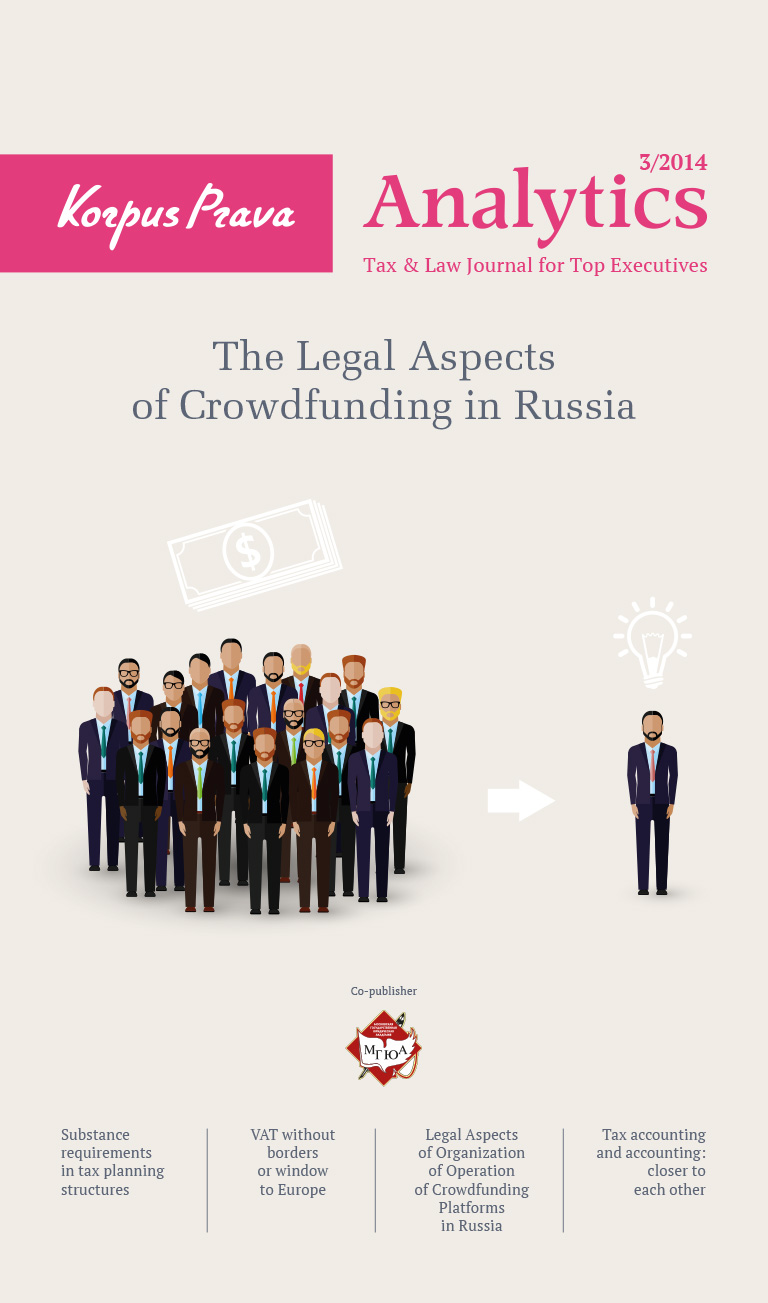- Cyprus Citizenship Scheme for Foreign Investors
- Squeezed But Pleased: Taxation of Passive Income in the European Union
- VAT Without Borders or Window to Europe
- Legal Aspects of Organization of Operation of Crowdfunding Platforms in Russia
- Substance Requirements in Tax Planning Structures
- “Deposit Splitting” of Individuals. Legal Civil and Criminal Aspects
One Swallow Does Not Make a Summer
Nowadays one of the most burning issues of the tax practice is the concept of an actual right to income in international tax relations.
Not long ago in order to justify the application of preferential tax rates or tax exemption stipulated by the Double Taxation Conventions Russian companies acting as tax agents submitted certificates of tax residency issued by the relevant counterparty or shareholder, and tax authorities did not go any further than that. However, global tendencies of fighting tax evasion are becoming more and more common in Russia. Since 2015, Russian tax residents have operated under the legislation on controlled foreign companies. Moreover, next year automatic information exchange on financial accounts is to be launched, which serves as a control instrument allowing tax authorities to trace automatically financial flows of their tax residents.
Recently, tax authorities carried out numerous tax inspections, which revealed illegal application of international treaties in cases when foreign companies are not qualified as actual income recipients. Such conclusions are supported by courts, including the Supreme Court of the Russian Federation1.
The definition and regulations regarding determination of an actual income recipient were added to the legislation of the Russian Federation by the Federal Law dated 24.11.20142, and a wide-spread application of the said regulations by the Russian tax authorities took place a couple of years ago. Therefore, tax payers often refer to the fact that this regulation is relatively new, and thus, the business requires some time to adjust to new circumstances. However, many people tend to forget that a possibility to apply provisions of the Model Convention and statements thereto as an interpretation source is based on general interpretation rules for international treaties set out in the Vienna Convention on the Law of Treaties (1969).
According to Article 31 of the Convention, “… the treaty shall be construed with good faith pursuant to the general meaning applied to the terms of the treaty in their context, as well as regarding objectives and purposes of the treaty…”. Articles 31–33 of the Convention define basic (for example, contractual context or any further agreement between the parties regarding the interpretation of the treaty) and additional (for example, preparation materials and circumstances of the treaty execution) interpretation sources as interpretation sources for international treaties.
The Plenum of the Supreme Court of the Russian Federation by Resolution No. 5 dated 10.10.2003 On Application by General Courts of Generally Accepted Principles and Regulations of the International Law and International Treaties of the Russian Federation recommends to apply international acts in cases of interpretation difficulties with generally accepted principles and regulations of the international law and international treaties of the Russian Federation. Resolution No. 8654 dated 15.11.2011 issued by the Presidium of the Supreme Arbitration Court of the Russian Federation defines the Model Convention as “framework document, which stipulates general principles and ways to avoid double taxation”.
Therefore, the Model Convention and Statements thereto may serve as an additional interpretation source for international treaties, as the case may be.
Article 10 “Dividends”, Article 11 “Interest”, Article 12 “Royalties” of the Conventions set out preferential taxation rates for the income payable to foreign companies which are applied solely in cases when a recipient of the income (resident of the country acting as a party to an agreement) is an actual recipient (beneficial owner) of this income in accordance with ОECD statements to the Model Convention.
Conventions are executed in order to stimulate economic cooperation between countries. The generally accepted principle of the international law concerning bona fide performance of treaties (pacta sunt servanda) recognized among others in Article 26 of the Vienna Convention does not grant tax benefits stipulated by international double taxation conventions when parties to a cross-border transaction abused the right, including profit gaining solely or mainly from tax benefits (beneficial taxation conditions) when performing a cross-border transaction.
Moreover, in 2014 the Russian Ministry of Finance clarified that in order to identify a person as an actual income recipient (beneficial owner) this person shall be a direct beneficiary, i.e. a person that gains benefits from the received profit and determines its further economic development. If an income recipient acts as an intermediary on behalf of another person that actually gains benefits from the relevant profit, granting of tax benefits (reduced rates and exemptions) in the country acting as a source of income paid to a foreign person, contradicts aims and objectives of international conventions3.
The current legal practice of identifying a person with an actual right to income and determining a right to apply regulations of international conventions allows to say that tax benefits are granted only to those companies that possess economic presence in the country of residence, have wide powers to dispose of their income and use their income for foreign company business activities (gain economic benefits from their income).
In such disputes tax authorities study and analyze the following factors:
- Independence of decision-making by directors of foreign companies;
- Powers of income disposal;
- Performance of entrepreneurial functions;
- Factors of carrying on business (personnel, office, general administrative expenses);
- Gaining economic benefits from their income (use in business activities);
- Bearing commercial risks concerning assets;
- Types of cash flows (presence or absence of legal or actual obligations for further income transfer);
- Consistency of transit payments for income transfer from a resident participant of the convention to a person with no benefits under the convention.
For the purposes of an objective and full analysis of company business activities, tax authorities shall not only study transactions of income transfer under dispute, but also pay attention to economic activities of the group in general.
Verification of an actual right to income or its absence is based on the additional information on cash flows between the companies of the group submitted by foreign jurisdictions, as well as reports from the companies. Tax authorities and courts accept commercial data bases, open registers of foreign companies, information from public sources as an evidence of the fact that an income recipient was not a true beneficiary of the received income.
In order for a tax authority to refuse granting benefits under the agreement, it may prove that a direct income recipient is not an actual income recipient and determine no ultimate beneficial income owner. Therefore, if a tax authority has established that a foreign person is not an actual income owner, one shall apply tax rates stipulated by the legislation of the Russian Federation on taxes and duties. If a tax payer (tax agent) submits a documented confirmation of a true beneficiary before the resolution of a tax inspection, tax authorities will consider this circumstance when establishing validity of preferential taxation.
One may obviously argue that the Russian Federation is not ОECD member, or that the concept of an actual income recipient has been introduced to the Russian tax law quite recently. However, one should consider Article 29 of the Conventions “Limitation of Benefits”, which stipulates that a resident of the Contracting State shall not be entitled to any tax reduction or tax exemption set out in the Convention regarding the income received from the other Contracting State, if the main purpose or one of the purposes for creation or existence of such a resident proved to be benefits granted under the Convention, otherwise unavailable.
- Ruling of the Supreme Court of the Russian Federation No. 307-КГ16-7111 dated 05.08.2016 in case No. А13-5850/2014, decision of the Arbitration court of Moscow District dated 25.01.2017 in case No. А40-442/2015, dated 27.05.2016 in case No. А40-116746/2015, dated 04.10.2016 in case No. А40-241361/2015, decisions of the Ninth Arbitration Court of Appeal No. А40-36068/15 dated 01.07.2016, No. А40-113217/2016 dated 07.02.2017, dated 04.08.2015 in case No. А40-12815/15, decisions of the Arbitration Court of Far Eastern District dated 31.05.2016 in case No. А04-6181/2015, decisions of the First Arbitration Court of Appeal dated 04.05.2017 in case No. А11-6602/2016, decisions of the Seventh Arbitration Court of Appeal dated 25.04.2017 in case No. А27-16584/2016.
- Federal Law No. 376-ФЗ dated 24.11.2014 On Amendments to Parts One and Two of the Tax Code of the Russian Federation (Concerning Profit Taxation of Controlled Foreign Companies and Income Taxation of Foreign Companies).
- Letter of the Ministry of Finance of the Russian Federation No. 03-00-РЗ/16236 dated 09.04.2014 On granting of benefits stipulated by international double taxation conventions.
Your subscription to our journal will definitely boost the efficiency of your specialists and downsize your expenses for consultants.
The journal is available free of charge in the electronic version.
Free Download

